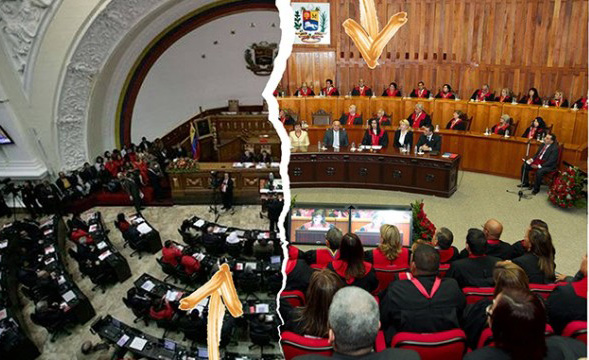The declaration of 17 May as National Day against Homophobia, Transphobia and Biphobia, a decision that was unanimously adopted by the National Assembly (AN), or the agreement as tribute to the 60 years of Luis Aparicio’s debut in the Major Leagues of the United States, are two of the ten parliamentary acts and seven laws that today are in suspension thanks to the last decision of the Supreme Tribunal of Justice (TSJ) against the parliament.
On Saturday, the Constitutional Chamber, in its judgment 797, resolved to precautionary suspend every resolution adopted by the Legislature from 26 April to 17 May, on the grounds that they may be vitiated, since the opposition majority did not abide by the instructions on how to convene plenary sessions of the body.
The ruling of the Supreme Tribunal occurs when admitting the nullity action with precautionary measure that the pro-government parliamentarians Pedro Carreño, Víctor Clark, Edwin Rojas, Loengri Matheus, Ramón Augusto Lobo, César Sandoval, Carmen Meléndez, Elías Jaua, Julio Chávez, Saúl Ortega, Juan Marín, Earle Herrera, Raiza Carrillo, Oscar Figuera, Ricardo Molina, Gerson Vizcaíno, Yul Jabour, Elio Serrano, Luis Soteldo, Sergio Fuenmayor, Aloha Núñez, Cristóbal Jiménez, Eduardo Linarez, Dante Rivas, Jorge Pérez, Carolina Vegas and Domingo Santana filed on 9 May against the National Assembly’s board, which they accused of not following the provisions of judgment 269 of the Constitutional Chamber.
In that verdict, the judicial body rewrote article 57 of the Internal and Debates Regulation and determined, inter alia, that the National Assembly’s meetings can only be scheduled 48 hours in advance and not with the 24 established by the rule, thus facilitating the transport of the representatives from the country’s inland to the capital city. However, the parliamentary fraction of the Democratic Unity Roundtable (MUD) continues to set the sessions as the text states, claiming that only the National Assembly can modify its internal rules.
Others put on ice
In addition to the agreement against homophobia and the major league player, the ruling drafted by Justice Juan José Mendoza left seven laws in the air, six of which were already approved in the first discussion. Among them are the reforms to the laws of Gaseous Hydrocarbons and to the Telecommunications one, as well as the projects that seek to establish indemnifications for the users of the electric service due to constant failures, the one that looks for to improve the salary of the teachers or the one of Simultaneous Broadcasts, Official Publicity and Public Media, that is to say, the one that seeks to regulate the presidential mandatory national broadcasted messages.
The only enacted law that had been discussed in the two opportunities provided by the Constitution, is that of the Emergency in the Health Sector, which was already overruled by the Constitutional Chamber, since it considers that the National Assembly usurped functions of the government.
However, one of the most important decisions that the TSJ held in abeyance with this decision was the vote of no confidence imposed on the Minister of Food, Rodolfo Marco Torres, for refusing to appear before parliament to explain the reasons for the food shortage and the measures that his office has been taking to solve the problem. This measure, according to the Magna Carta, should imply the dismissal of the official by President Maduro, which has not happened.
So far, the law banning prisoners from using cell phones is the only instrument that has left the Federal Legislative Palace in these seven months and has been endorsed by the head of state and is, therefore, already in force, even though it was issued without respecting the changes to the Regulation that the Maximum Tribunal intends to impose on the deputies.
Extract of the Judgment
The members of the National Assembly’s Directive Board, in the first place, convened the referred meetings without attending to the previous forty-eight (48) hours period before, established by this Constitutional Chamber (…) on 28 April, 03 and 05 May 2016 they made changes to the content of the agenda, again failing to comply with judgment n° 269 of 21 April 2016, and therefore, breaching the constitutional order that must prevail in the democratic institutions of the Bolivarian Republic of Venezuela».
